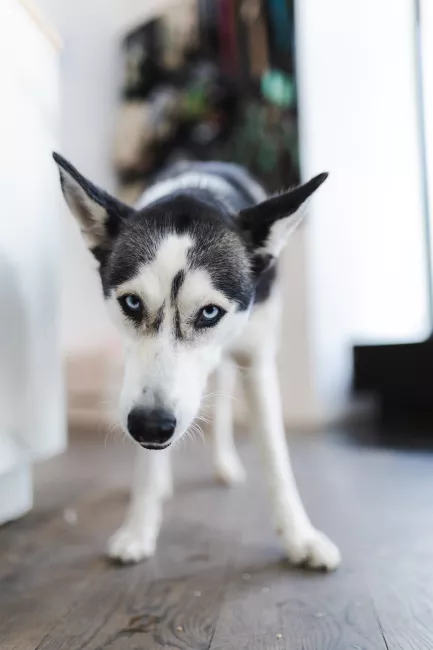Useful gift to your subscription
Get meat dog cookies from the famous bakery Dogtown with your first order for FREE! Become part of our Furnatura pack and receive practical advice, tips and great deals from the world of dogs
_1500x700.webp)
BLOG
Dogs have up to 300 million olfactory cells, compared to our 5 million.
We humans spend more time interpreting visual sensations than olfactory information. In dogs, it's just the opposite. A dog's brain has a huge section devoted to analyzing smells. This area is 40 times larger than in humans. Thanks to this, they can smell their master from 300 meters away, detect a trail that is several days old, and recognize human diseases such as cancer, diabetes and epilepsy. This ability could play a key role in medical diagnosis and improve predictions of early detection of disease.
Each dog breed has differently sized olfactory receptors and is therefore differently sensitive to all olfactory sensations. For example, brachycephalic breeds (breeds with a short muzzle) will not be as good at tracking as, for example, Pointers or Dachshunds.
Sniffing is also a great energy expenditure, so your furry friend will be just as tired from a well-sniffed walk as from running after a ball.
The canine sense of smell is an incredibly powerful and important sense even in the social life of our friends.
The secret of the dog's amazing ability to smell lies in its anatomy. The dog's nose is equipped with an enormous number of olfactory receptors. It is maximally adapted to pick up information from the air. They can inhale and exhale at the same time, so they take in smells even when they're exhaling. Dogs are thus able to pick up a range of smells from different directions, determine the direction of the smell and use their nose as a compass.
Dogs are known for their ability to detect different substances using their sense of smell. Training programs use this unique skill to train police dogs to detect drugs and explosives or to train rescue dogs to find missing persons under rubble or snow.
The canine sense of smell is an incredibly powerful and important sense even in the social lives of our friends.
Dogs leave behind excretions, called pheromones, which contain information about their age, sex, mood, fertility and other important factors.
Thanks to their sense of smell, dogs recognize who is an enemy, what to watch out for, who is dominant or submissive. A dog's sense of smell is therefore not only a tool for perceiving the world, but also a means of communication between dogs.
Because the wetness of the nose has a meaning. A moist muzzle cools the dog and protects the nose from dirt. But most importantly, the dog needs the solution from the moist nose to deliver odor particles to the brain.
The sniffing and information processing style is also interesting. When they start sniffing, they prefer the right nostril. Familiar scents, they then move to the left nostril. Conversely, for scents they find unpleasant or threatening, they stay with the right nostril. This preference is related to how information is processed in the brain: the right hemisphere is focused on novel stimuli, while the left hemisphere controls responses to familiar sensations.

Aromatherapy can be used to help dogs with various mental disorders and illnesses. It is their developed sense of smell that makes it work well on them, but you need to be careful and choose the fragrance essences and their dilution well.
Through our two-year survey of dogs who came to our salon, we found out which scent they found most pleasing. We then transferred the narrowest selection to our products. Because in dogs, as in humans, certain scents help to counteract stress and induce a sense of happiness and well-being. Others energise and encourage the dog to be active.
How the dog feels during and after the bath is just as important to us as the effect the cosmetics have on the coat.

The most popular among dogs is the essence of sweet orange, which has stimulating effects. That is why we have used it in a shampoo that is suitable for virtually every breed.
Other popular scents include calming ones - chamomile, lavender or geranium. Their effect is primarily skin-soothing, but they also soothe the dog and help it relax during the bath.
By the way, did you know that a muzzle print is as unique as a human fingerprint?
The Canadian Kennel Club has even accepted snout prints as proof of a particular dog's identity since 1938.
